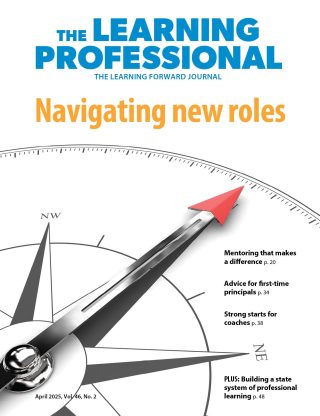Attending to the mental health of everyone in schools is critically important, especially now. According to a recent Gallup poll, “More than four in 10 K-12 workers in the U.S. (44%) say they ‘always’ or ‘very often’ feel burned out at work.” Notably, “within the K-12 employee population, teachers are the most burned out, at 52%” (Marken, 2022). And according to a recent survey of U.S. principals, assistant principals, and high school students by the National Association of Secondary School Principals, about three-fourths of school leaders (73%) and students (74%) reported that they needed help with their mental or emotional health last year (NASSP, 2022).
In addition, there is increased discussion since the start of the pandemic among educators at all levels about how adverse childhood experiences impact teaching and learning. Childhood stress can cause students to have challenges with executive functioning and emotional regulation, impulsivity, communication, and attention — all of which have an impact on classroom behavior and relationships. (See more about trauma’s impact on learning in “What to do when the kids aren’t alright” on p. 34 of this issue.) Recent heightened attention to equity issues has underscored the need to address stress and trauma to ensure that all students’ social and emotional needs are met so that all students can succeed in school.
In this context, it is important to look to the evidence about whether and how investments in professional learning designed to address and support students’ and educators’ social and emotional health lead to positive results. One such approach is called trauma-informed practice. Trauma-informed practice takes the approach that students’ challenging behaviors could be due to previous or ongoing trauma and therefore focuses on the student’s need for support, rather than attributing the behavior to defiance or disrespect and responding with discipline or exclusion.
Research suggests that building knowledge and understanding about trauma can improve educators’ relationships with students, increase the use of positive approaches to student behavior and learning, and potentially reduce teachers’ stress and burnout.
A recent study yields promising findings about how professional learning that addresses educator awareness about trauma as well as trauma-informed approaches can positively impact educator outcomes with regard to supporting students, burnout, and self-efficacy.
Methodology
MacLochlainn et al. researched a whole-school trauma-informed program in Northern Ireland called the Compassionate Schools approach. The Compassionate Schools program is grounded in growing evidence about the positive effects on students and educators who engage with trauma-informed practices and is supported by a free handbook designed to be integrated with existing curricula. The goals of the whole-school program are to improve social and emotional learning, improve academic skills of students, and increase the well-being of staff. The intervention studied was a two-day professional learning focused on an introduction to the program, information about how trauma impacts a child’s ability to learn, the goals of a trauma-informed approach, self-care guidance for teaching staff, trauma-informed classroom strategies, and the importance of community engagement. The professional learning also included a discussion of how teacher-student interactions that reflect compassion and empathy can increase student resiliency.
The research questions were:
Would a two-day professional learning in trauma-informed approaches change school personnel attitudes related to trauma-informed care, and would any changes made be maintained at a six-month follow-up?
Would the professional learning influence school personnel’s levels of compassion fatigue, burnout, and secondary traumatic stress at a six-month follow-up?
This research compared attitudes and compassion fatigue among 216 educators using two scales: the Attitudes Related to Trauma-Informed Care (ARTIC) and the Professional Quality of Life (Pro-QoL). Quantitative data from the scales was augmented by qualitative data from focus groups.
The researchers note that this is the first study of a whole-school trauma-informed program to use a control group in the research design, adding to the rigor of the study and the value of the findings. Ninety-eight educators participated in the professional learning, while the 118 in the comparison group were put on a waitlist to engage in the professional learning post-study. Researchers use this waitlist control group strategy when it is considered ethically important to not deny one group of educators the professional learning about valuable knowledge and skills. The researchers also surveyed both the 98 participants and the control group six months after the professional learning to determine if any changes were maintained over time.
Survey results
The MacLochlainn research found that the program improved educators’ attitudes toward trauma-impacted students and resulted in a decrease in educator burnout among those who participated. These effects lasted when researchers surveyed the educators six months later.
The original participants showed significant positive improvement in overall scores and all subscale scores over three administrations of the ARTIC scale, which is used to assess attitudes among school staff about working with trauma-impacted individuals, including readiness to implement trauma-informed practices, potential barriers, and attitudinal change over time. The validated instrument includes Likert-scale items such as “students are doing the best they can with the skills they have” and “each day is uniquely stressful in this job.”
The positive changes remained six months after the workshop, with participants noting that they were now more aware of the profound impact trauma can have on students and a belief that the training had assisted them in their ability to deal with “dysregulation in the classroom.” The research also found that educators in the intervention group experienced a slight reduction in burnout immediately after the professional learning and maintained that improvement six months out.
Focus group findings
Seventeen members of the teaching staff also participated in focus groups about their experiences with the Compassionate Schools program. Semistructured conversations invited the educators to talk about work-related changes following the professional learning, as well as about personal growth, barriers related to implementing the trauma-informed framework and practices, and self-care. Overall, the focus groups corroborated the quantitative evidence from the surveys, revealing that “the trauma-informed CS training workshop had a positive effect on teaching staff perspectives, attitudes, and behaviours, which led teachers to adapt their roles within the classroom to a more trauma-informed, compassionate approach.”
More specifically, four themes emerged from the focus groups:
Challenges: Among the challenges described by focus group participants were the increasing pressures related to getting results as measured by grades and percentages while working hard to accommodate trauma-related student behaviors and the resulting outcomes. Educators also commented about the need for more support from system leaders in implementing the new approaches to behavior management.
Self-care: Educators said that more support from leadership would be helpful as teachers tried to balance self-care with classroom and other duties.
Outreach: Educators said that students would benefit from more information about the Compassionate Schools program as well as in the related behaviors to build a common understanding in classrooms. Some educators said that every person in the school should participate in the program; others expressed a desire to have families and community members engaged as well.
Role adaption: Teachers said that they were identifying more trauma-impacted students based on an increased awareness of how that might look in the classroom. They noted that, in addition to a change in attitude, they could see the need to adapt previous approaches, pausing to assess student behavior in a holistic way, and consider alternative ways of engaging or reacting.
Implications for practice
It is critical, especially now, to support educators’ social and emotional health and their feelings about being able to be successful in their classrooms and their relationships with students. Unrecognized trauma-related behaviors can be overwhelming to students and teachers alike, exacerbated by a lack of understanding and a limited toolbox of helpful strategies and practices.
This study is relatively small but is clear about how a focused workshop can change educators’ knowledge and attitudes about students impacted by trauma as well as trauma-informed schools and practices. Although the professional learning being studied is short in duration (a two-day intensive workshop), the pre- and post-workshop data show that it had a significant and lasting positive effect on attitudes related to trauma-informed care.
These findings support the idea that intensive workshops have their place in a comprehensive approach to improving teaching through professional learning. However, the focus groups also surfaced that the teachers who had been through the short workshop wanted more opportunities to learn about trauma-informed practices and strategies.
As the Learning Designs standard of the Standards for Professional Learning notes, the duration and approach of the professional learning may need to be expanded to address that emerging need as well as a newly recognized need to change attitudes about trauma-informed practices among students, family and community members, and leaders. Other research suggests more intensive and long-lasting interventions hold promise. For example, Kim et al. (2021) conducted a mixed method study of a two-year intervention that combined trauma-informed practice with a mindfulness-based program for educators and students and found that it improved educators’ attitudes and reduced burnout levels. (See p. 22.)
Building knowledge and skills among educators to recognize and respond to trauma-related student behaviors addresses key aspects of the Equity Practices standard: “honoring all aspects of identity students bring to the school” and “deepening their understanding of who their students are and how their life experiences and identities impact what they need at school” (Learning Forward, 2022). It can be challenging to understand what it means to honor students’ identities and understand their life experiences in a classroom setting. Studies that provide detail about how programs and practices help achieve this aspiration in the Equity Practices standard and share the impact on teacher attitudes and practices can be a valuable starting point for educators seeking to better support all students.
The study
MacLochlainn, J., Kirby, K., McFadden, P., & Mallett, J. (2022, January 5).
An evaluation of whole-school trauma-informed training intervention among post-primary school personnel: A mixed methods study. Journal of Child & Adolescent Trauma, 15, 925-941. doi.org/10.1007/s40653-021-00432-3
A mindful approach to teacher burnout
Another recent study about a trauma-informed program in Ontario, Canada, is a good complement to the MacLochlainn study and highlights a range of ways to infuse trauma-informed practices into classroom practice. Kim et al. (2021) conducted a mixed method study of how a two-year trauma-informed, mindfulness-based program impacted educators’ attitudes and burnout levels.
The Kim study looked at 112 educators over three years: 41 in the comparison group and 71 educators implementing a mindfulness and social and emotional learning curriculum called MindUP. The professional learning included a half-day focused on trauma-informed practices and two full days focused on the MindUP curriculum. The curriculum includes 15 teacher-led lessons along with four units about neuroscience, mindful awareness, and social and emotional learning. A core practice of the curriculum is a mindful breathing exercise three times a day.
As in the MacLochlainn study, the researchers administered the ARTIC scale to educators. They also had educators complete the Maslach Burnout Inventory, which includes items such as, “I deal very effectively with the problems of my students.” Researchers conducted 17 focus groups across the three years as well.
The overall ARTIC scores significantly increased for educators in the participant groups, even after the educators rated themselves fairly highly on the ARTIC scale before the program started. There were also significant improvements on the self-efficacy items among educators who participated for two years. There were some subscales with no statistically significant changes over the course of the study.
The focus group responses revealed the value of the new knowledge about how trauma can show up in students and classrooms. Educators made comments like, “Sometimes, something so small that normally wouldn’t bother a child makes this particular child just snap. From that training, you realize there’s so much going on. … It changes how you approach everything.”
The researchers summarized the focus group data by saying, “Taking this approach has allowed educators to be more ‘understanding and patient,’ ‘forgiving,’ and ‘compassionate.’ ” Teachers observed that students’ breathing breaks and mindful pauses and behaviors resulted in improved listening skills, emotional self-regulation, and classroom behaviors.
The study found that the curriculum had a positive impact on the teachers as well. Improvements were especially noticeable among teachers who had participated for two years. One teacher said, “It’s not just them that needs the brain break, it’s me. That has really changed for me as a teacher, for getting a handle on my own frustrations that are inevitable in teaching when you are in a room full of kids with interruptions.”
Another educator expressed the value of slowing down the pace of the classroom with mindfulness breaks: “That’s time I need to spend because I’m going to gain it back later with more productive work.”
References
Kim, S., Crooks, C.V., Bax, K., & Shokoohi, M. (2021, January 9). Impact of trauma-informed training and mindfulness-based social-emotional learning program on teacher attitudes and burnout: A mixed-methods study. School Mental Health, 13, 55-68. doi.org/10.1007/s12310-020-09406-6
Learning Forward. (2022). Standards for Professional Learning. Author.
Marken, S. & Agrawal, S. (2022, June 13). K-12 workers have highest burnout rate in U.S. Gallup. news.gallup.com/poll/393500/workers-highest-burnout-rate.aspx
NASSP. (2022, August 16). NASSP survey of principals and students reveals the extent of challenges facing schools. www.nassp.org/news/nassp-survey-of-principals-and-students-reveals-the-extent-of-challenges-facing-schools/

Elizabeth Foster is the senior vice president of research and strategy at Learning Forward. She leads the organization’s research efforts for partnerships, programs, and fundraising. Elizabeth co-wrote the Standards for Professional Learning (2022) with Tracy Crow and now facilitates learning sessions about the standards and develops resources that support their use and implementation.
Recent Issues
LEARNING DESIGNS
February 2025
How we learn influences what we learn. This issue shares essential...
BUILDING BRIDGES
December 2024
Students benefit when educators bridge the continuum of professional...
CURRICULUM-BASED PROFESSIONAL LEARNING
October 2024
High-quality curriculum requires skilled educators to put it into...
LEARNING TO PIVOT
August 2024
Sometimes new information and situations call for major change. This issue...












